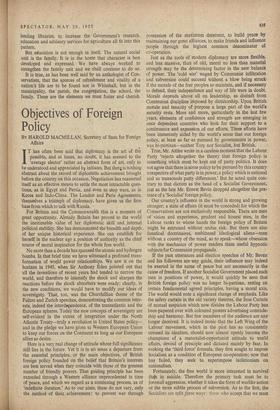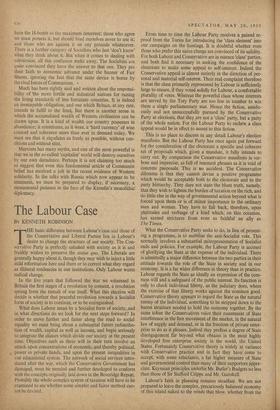Objectives of Foreign Policy
BY HAROLD MACMILLAN, Secretary of State for Foreign Affairs IT has often been said that diplomacy is the art of the possible, and at times, no doubt, it has seemed to the 'average elector' rather an abstract form of art, only to be understood and appreciated by initiates. But ther; is nothing abstract about the record of diplomatic achievement brought before the country on this occasion. Negotiation has reasserted itself as an effective means to settle the most intractable ques- tions, as in Egypt and Persia, and even to stop wars, as in Korea and Indo-China. The London and Paris Agreements, themselves a triumph of diplomacy, have given us the firm base from which to talk with Russia.
For Britain and the Commonwealth this is a moment of great opportunity. Already Britain has proved to the world the inestimable value of her diplomatic skill and . internal political stability. She has demonstrated the breadth and depth , of her unique historical experience. She can establish for herself in the nuclear age a.position of authority as the chief source of moral inspiration for the whole free world.
No more than a decade has spanned the atomic and hydrogen bombs. In that brief time we have witnessed a profound trans- formation of world power relationships. We saw it on the horizon in 1945, when Sir Anthony Eden pointed out that all the inventions of recent years had tended to narrow the world, and therefore to intensify the shock and sharpen the reactions before the shock absorbers were ready; clearly, in the new conditions, we would have to modify our ideas of sovereignty. That, too, was the Churchillian theme of the Fulton and Zurich speeches, demonstrating the common inter- ests, indeed the interdependence, of the transatlantic and the European spheres. Today the new concepts of sovereignty are self-evident in the extent of integration under the North Atlantic Treaty—truly a revolution in United States policy— and in the pledge we have given to Western European Union to keep ourforces on ,the Continent as long as our European allies so desire.
Here is a very real change of attitude whose full significance still lies it the future. Yet it is in no sense a departure from the essential principles, or the main 'objectives, of British foreign policy founded on the belief that Britain's interests are best served when they coincide with those of the greatest number of friendly powers. That guiding principle has been extended through a Western alliance unprecedented in time of peace, and which we regard as a continuing process, as of 'indefinite duration.' As to our aims, these do not vary, only the method of their achievement: to prevent war through possession of the maximum deterrent, to build peace by maintaining our great alliances, to make friends and influence people through the highest common denominator of co-operation. Just as the tools of modern diplomacy are more flexible, and less massive, than of old, moral no less than material strength may be the determining factor in the new balance of power. The 'cold war' waged by Communist infiltration and subversion could succeed Without a blow being struck if the morale of the free peoples to maintain, and if necessary to defend, their independence and way of life were in doubt. Morale depends above all on leadership, as distinct from Communist discipline imposed by dictatorship. Upon British morale and tenacity of purpose a large part of the world's security rests. More and more, particularly in the last few years, elements of confidence and strength are emerging in once dependent countries who look for their support to a continuance and expansion, of our efforts. These efforts have been immensely aided by the world's sense that our foreign policy, at least so far as pursued by governments in power. was bi-partisan—neither Tory nor Socialist, but British.
True, Mr. Attlee wrote in a careless moment that the Labour. Party 'rejects altogether the theory that foreign policy is something which must be kept out of party politics. It does not agree that there is some policy to be pursued by this country irrespective of what party is in power, a policy which is national and so transcends party differences.' But he acted quite con- trary to that dictum as the head of a Socialist Government, just as the late Mr. Ernest Bevin dropped altogether the pre- tence of a 'Socialist' foreign policy.
Our country's influence in the world is strong and growing stronger; a state of affairs (it must be conceded) for which the Conservatives are not exclusively responsible. There are men of vision and experience, prudent and honest men, in the Labour ranks to whose hands the foreign policy of Britain might be entrusted without undue risk. But there are also fanatical doctrinaires, embittered ideological aliens—men without a country of the mind, so to speak—whose obsession with the mechanics of power renders them useful hypnotic subjects for Communist propaganda.
If the past utterances and election speeches of Mr. Bevan and his followers are any guide, their, influence may indeed be exerted in the name of peace but not necessarily in the cause of freedom. If another Socialist Government placed such men in positions of power, it would quickly be seen that British foreign policy was no longer bi-partisan, resting on certain fundamental agreed principles, having a moral axis. The world would note a significant change of emphasis. Like the safety curtain in the old variety theatres, the Iron Curtain Of mutual suspicion which now divides the Labour Party has been papered over with coloured posters advertising comrade- ship and harmony. But few members of the audience are any longer deceived. It is indeed ironic that the Left Wing of the Labour movement, which in the phst has so consistently stressed its idealism, should now almost openly become the champions of a materialist-opportunist attitude to world affairs, devoid of principle and dictated mainly by fear. In evoking the 'third force' formula, they first sought to impose Socialism as a condition of European co-operation; now that has failed, they seek to superimpose isolationism on nationalism.
Fortunately, the free world is more interested in survival tht in suicide. Therefore the primary task must be to forestall aggression, whether it takes the form• of warlike action or the more subtle process of subversion. As to the first, the Socialists are split three ways: those who accept that we must have the H-bomb as the maximum deterrent; those who agree we must possess it, but should bind ourselves never to use it; and those who are against it on any grounds whatsoever. There is a further category of Socialists who just `don't know' what they think about it. But when it comes to dealing with subversion, all this confusion melts away. The Socialists are quite convinced they have the answer to that one. They pin their faith to economic advance under the banner of Fair Shares, ignoring the fact that the same deVice is borne by the rival forces of Communism. • Much has been rightly said and written about the responsi- bility of 'the more fertile and industrial nations for raising the living standards of less fortunate countries. It is indeed an inescapable obligation, and one which Britain, at any rate, intends to fulfil to the limit. But there is another sense in which the accumulated wealth of Western civilisation can be drawn upon. It is a kind of wealth our country possesses in abundance; it constitutes, as it were, a `hard currency' of wise counsel and tolerance more than ever in demand today. We must see that it circulates as freely as possible, without con- ditions and without stint.
Marxism has many myths, and one of the most powerful is that we in the so-called `capitalist' world will destroy ourselves by our own decadence. Perhaps it is not claiming too much to suggest that even this fundamental article of Communist belief has received a jolt in the recent evidence of Western solidarity. In the talks with Russia which now appear to be imminent, we must be prepared to display, if 'necessary, a monumental patience in the face of the Kremlin's monolithic diplomacy.











































 Previous page
Previous page